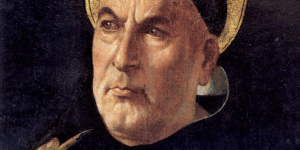By John Paulett, Fenwick Theology Teacher
Editor’s note: Monday, January 28, is the feast day of Saint Thomas Aquinas, priest and doctor of the Catholic Church and patron of students.

Readers interested in exploring the excellent videos of Bishop Robert Barron, the recipient of the Lumen Tranquillum Award from Fenwick High School this year, might start with the short presentation he gives on the man he describes as his hero: St. Thomas Aquinas. The bishop explains how it was at Fenwick, when he was 14 years old, that a theology teacher first introduced him to St. Thomas Aquinas. He describes it as a “bell-ringer” event and goes on to explain how it changed the course of his life. He seems to suggest that this seminal moment led him, through the grace of God, into the priesthood.
Besides his description of the encounter in his freshman theology class, there is another deep Fenwick link in Barron’s explanation of Aquinas. He lists three ideas, which he believes characterize the thought and teaching of Thomas. It is interesting to note how closely the three themes he describes resemble three main ideas characteristic of a Fenwick education. Many high schools talk about the “grad at grad,” or what a graduate will know and be. I would suggest that these three concepts, reflective of the teaching of St. Thomas Aquinas, might be a good description of a Fenwick student after four years on Washington Boulevard.
Bishop Barron first explains in the video that Aquinas believed there was one truth. He explains that people of Thomas’s time (we might note of our time as well) often thought there were two truths — scientific and religious. Aquinas refused to accept that. He knew that there could be only one truth. If science and religion seemed to be in conflict, there was a problem in either the scientific or the theological method. More thought and study were required.
‘Dominicans are not afraid of reason; we embrace it.’

At Fenwick, we sometimes express this same idea as, “Don’t leave your brain at the door of the church (or the theology classroom.)” It is a characteristic of Dominican education to apply rigorous study and thought to every aspect of our education, including our religious belief. We are not afraid of reason; we embrace it. We are convinced that reason and critical examination will lead to the Creator, not contradict creation.
And so we teach Fenwick students to question, to wonder, and to apply the lessons they learn from science and philosophy to their faith. Bishop Barron reassures us that Aquinas had no fear of reason. Neither should we.
Radical Humanism
Secondly, Barron describes the Thomistic understanding that we are contingent beings. This is a fancy way of saying that we depend on something else for our existence. That thing that is the First Cause, what does not depend on anything else for its existence, is what we call God. It was this explanation of the Proofs of the Existence of God that first rang the bell of 14-year-old Bob Barron. [A Western Springs resident, he transferred to Benet Academy in Lisle.]
I often say to myself, “There is a God and it is not me.” When we recognize that we are dependent on a power beyond ourselves (12-step programs would call it a Higher Power,) we are on the path to faith. We begin this journey with the destruction of self-centeredness and ego. Christian theology calls it “death to self.” In the gospel of John, Jesus tells us, “Unless a grain of wheat falls into the ground and dies, it remains alone. But if it dies, it produces great fruit.”
Continue reading “‘Death to Self:’ Bishop Barron’s Calling Began at Fenwick”
